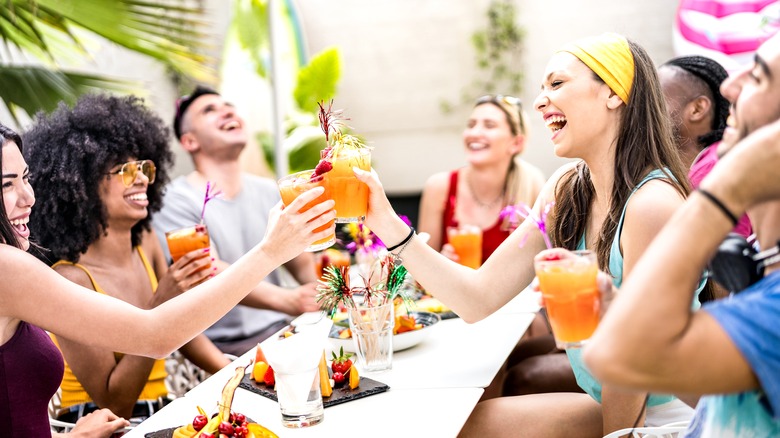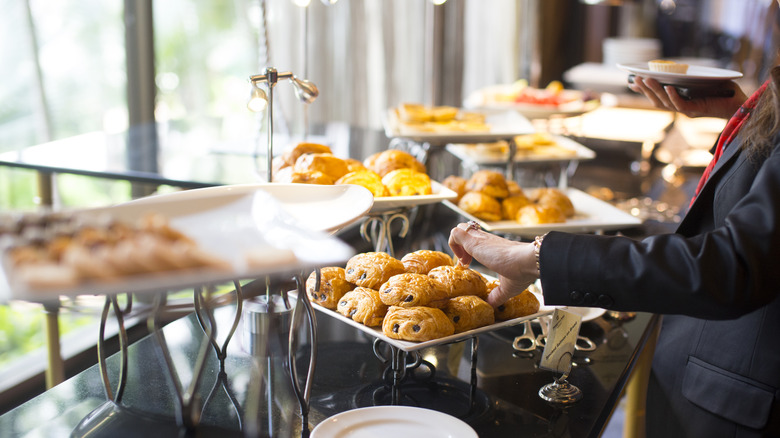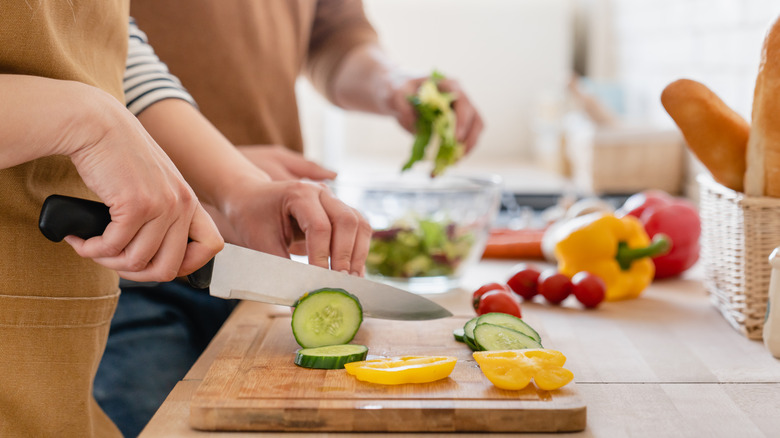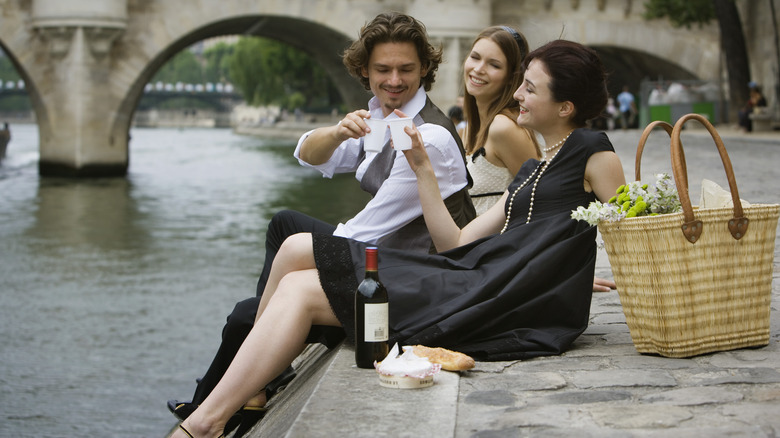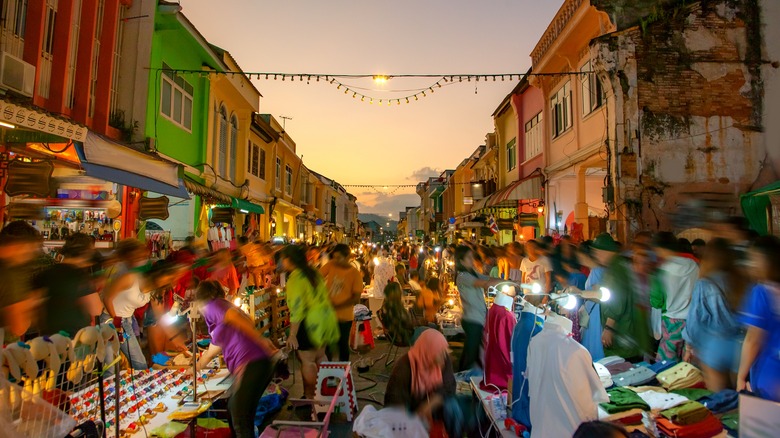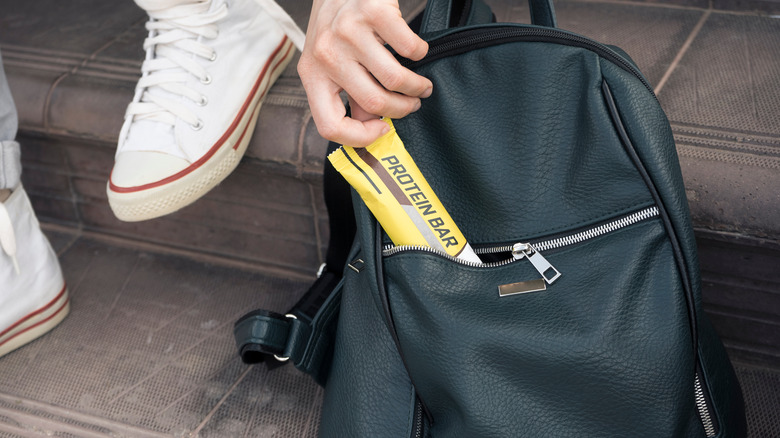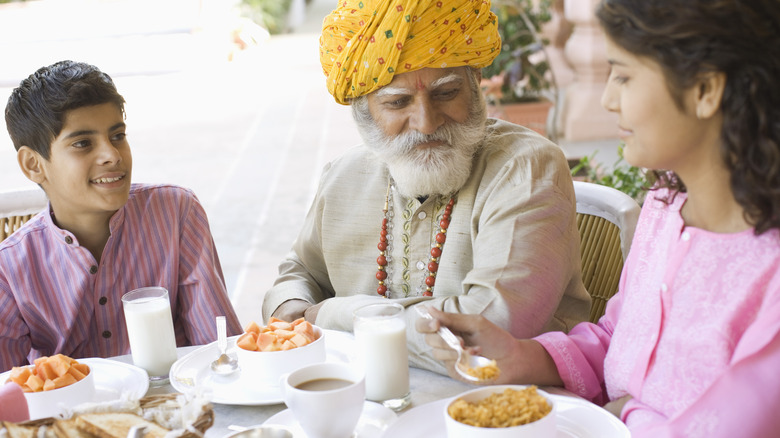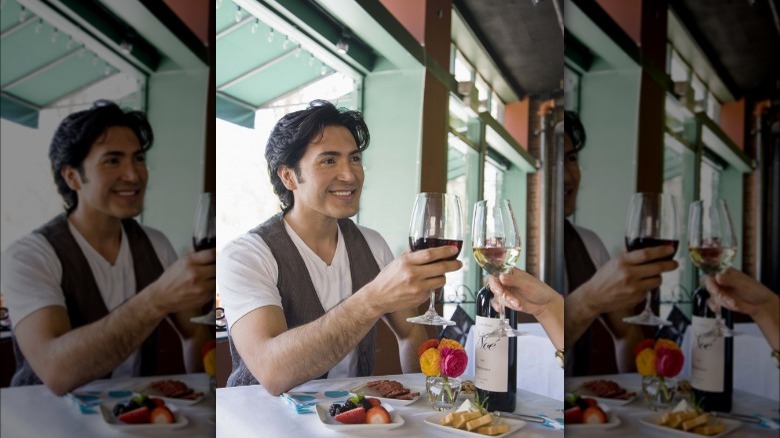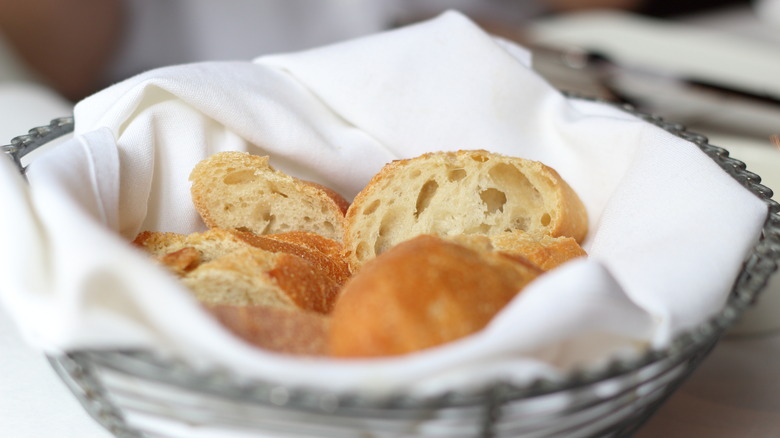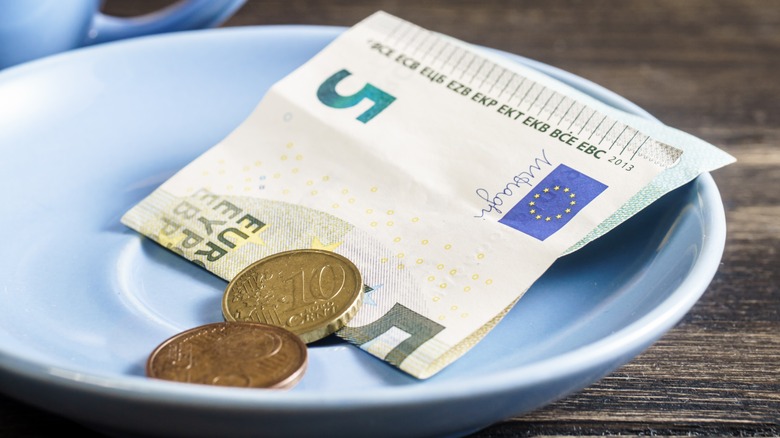12 Tips For Spending Less On Food When Traveling
Transportation and hotels might be huge chunks of the cost of a vacation, but the price of food can add up quickly, too. Surprisingly, when it comes to vacation costs, food and entertainment are actually the last budget considerations for travelers, according to Bankrate. Obviously, you have to eat, so it's not an unavoidable expense altogether. However, there are plenty of ways to cut down on the cost while you're traveling anywhere in the world.
Before you leave, try creating an estimated food spending budget based on the costs of wherever you're going. Major metropolitan places are going to be more expensive than rural destinations, so keep that in mind while you're determining what you can spend. It's OK to go over or under your budget on certain days of your vacation if your finances allow it, and it helps that the days where you spend less could balance that out. Bear in mind that some folks find maintaining a budget spreadsheet helps to keep their peace of mind while traveling, while others like to set a daily limit and leave it at that. Whatever your budget management mindset, here are some easy ways to keep those travel food costs down.
Carry a reusable water bottle
By bringing your own reusable water bottle with you when you travel, you're saving money by not having to buy water when you're thirsty. Disposable water bottles are horrible for the environment and also frequently price-gouged, particularly in places where there are a lot of tourists. Not having to shell out money every time you're thirsty will save you a lot in the long run.
At the same time, bringing the bottle with you helps you stay hydrated throughout the day. Staying hydrated will help you determine whether you're actually hungry or just need some water. It's pretty common for people to have a hard time distinguishing between hunger and thirst cues because they're so heavily linked in the body. Before filling up your bottle, be sure to verify if the tap water in a foreign country is safe to drink.
Staying hydrated isn't just important to keep your body happy, it also helps your body better identify hunger triggers because it's not also struggling with dehydration. Traveling can dehydrate you quickly, whether you're boarding a plane or expelling energy while adventuring in the great outdoors. To stay on top of your hydration, try incorporating water-based foods into your meals as well to help you stay hydrated on the go. Some of those go-to foods include cucumbers, grapes, zucchini, and broccoli.
Don't eat out for every meal
It's tempting to treat yourself to dining out for three meals a day (plus snacks) when you're traveling, but those costs add up quickly. By switching up your dining habits you can save so much money. This doesn't mean skipping any meals, it means preparing things yourself and perhaps dining out only once per day. If you decide to eat out for one meal a day, Nomadic Matt told Nerd Wallet that lunch is the best meal to splurge on.
"Many restaurants, especially in Europe, offer lunch specials, where items on the dinner menu are offered at a huge discount," he told the outlet. "You can get an amazing afternoon meal for a fraction of the cost you'd pay for the same meal in the evening." Not to mention, if you're lucky, the meal will be big enough to split into a dinner portion as well!
Paying out of pocket for meals doesn't feel like a lot when you're doing it. A little here and a little there doesn't seem budget-breaking. But to show how quickly those costs add up, Saving Advice demonstrated with road trip comparisons for their family of five. They estimated that, for the 12 road trip days they had over two months, they would've spent a whopping $1,680 by eating out both lunch and dinner for those days. If you were to cut those eating-out excursions in half, you'd save a pretty penny!
Always eat breakfast
Some people are coffee for breakfast people, we get it. But skipping the actual food part of breakfast when traveling is a big no-no for budgeting. If your hotel offers free breakfast, you should take advantage of it! Complimentary breakfasts are one extra thing you don't need to worry about paying for when you're on vacation. So fill up on that tasty free offering and maybe even grab a piece of fruit for the road.
Beyond the financial ramifications, there are physical reasons you need to eat breakfast too, particularly if you're going to be walking a lot on your trip. Vacayou lays those reasons out simply: breakfast alleviates natural dehydration, refuels your body with nutrients, and it increases your brain power for the day. You want to be fully awake, functional, and thriving to really enjoy your travels. A full breakfast is a big piece of that puzzle. It also keeps you from impulse buying expensive food while you're wandering around.
Ideally, that breakfast you're having is also a balanced one to keep your body operating at its fullest. Jenn LaVardera, a dietitian and nutritionist at Daily Harvest, told the Huffington Post how to easily balance that first big meal. You'll want to incorporate fiber, protein, and healthy fats in your breakfast to help your body feel full, she told the outlet. While complimentary breakfasts are increasingly difficult to come by around the world, finding a hotel with one or at least an inexpensive breakfast spread is a great way to offset food costs.
Ask about house wines or beers
Whenever you order alcohol with a meal, your bill can become significantly more expensive. If you're ordering wine or beer frequently, you'll be shocked at how much you end up spending. Asking about the house wine or beer is one way not just to get to know the wine from wherever you've traveled to, but it's also an easy way to lower your overall food spending.
Not only can the house wines be cheaper, they can also have fascinating backgrounds that inspire your travel story for later. If you happen upon a family-owned restaurant, it's possible their house wine is family made or made especially for their restaurant, notes Our Tasty Travels. Strike up a conversation with folks at the restaurants and they might even give you some insights about their offerings you wouldn't get anywhere else.
Although house wines and beers are assumed to be the cheaper options, it isn't always the case. House brands are what the restaurant recommends, so it might not necessarily be the bargain option. Rather than immediately opting for the house option right off the bat, ask to see the wine or beer menu first. Also remember that ordering by the bottle or half bottle may also be cheaper than buying per glass, especially if other members of your party are going to be drinking, too.
Make your own meals
Don't let the lack of a kitchen while traveling scare you, it's still simple to prepare some of your own meals. Schedule a grocery store visit early in your trip, and stock up on some simple ingredients and things to eat. Local ingredients are going to be cheaper, so try out some local recipes while you're traveling, that way you won't feel like you're missing out by not eating in restaurants the whole time.
Making your own food isn't just cheaper, it's also healthier too. Because you get to determine what goes into the food you're making, it's much easier to stick to any special diets you're accommodating or even picky eaters if you have little kiddos along . Cooking your own meals or buying grab-and-go options from the store will be a fraction of the cost of eating out all the time while in a new place.
When you go to the local market, check out what other folks are picking up if you're looking for recommendations. Enjoy the local staples and play around with some potentially new ingredients. Maybe you'll even go home with a new recipe or favorite snack. For us, halloumi (a Cypriot cheese made with both goat and sheep milk) is one of those foods we met abroad and can't get enough of now.
Have a picnic
Chances are you've seen pictures of people picnicking in the lush green grass in full view of the Eiffel Tower. Whether you're Paris-bound or not, there are plenty of picturesque places around the world to enjoy nature and nosh. Pick up some local delicacies (baguettes, for example, are an easy go-to) that can be eaten together and make your own travel-friendly charcuterie board.
Part of the allure of picnicking is putting together the spread. That's best done at a local market where you'll get the freshest goods, but be careful about where you go to get a good deal. International Travel News advises budget-weary travelers to be wary of market merchants in tourist centers because they will rip you off or overcharge you. When purchasing your products, find the price list and watch when the merchants are weighing your products to ensure you're paying what you should be paying. Most of all, don't forget to enjoy yourself! Picnicking is a lovely way to save money on food while also just enjoying the fresh air and atmosphere of wherever you find yourself.
Don't diss the food carts
Food stalls or carts can get a bad rap, but they've been catering to hungry folks forever. Grabbing food from one of these local vendors while you're traveling is one way to eat out without the price point of a restaurant. Or to stave off mealtime hunger with a little snack to keep you happy. One easy way to tell if a vendor is reputable is to see how busy it is, often the busier the better (via Airfare Watchdog). You can also always ask your hotel or hosts for recommendations of good food stalls to check out.
Nomadic Matt lauded food stands as a great way to save money while savoring tasty eats. "Street food is some of the best food in the world. Meals at street stalls — different from street vendors, who have a bit more permanent setup — cost less than a dollar most of the time and are a great way to really experience the local cuisine," he told Nerd Wallet. You could easily eat through half a dozen stands and still pay a fraction of what you would at a restaurant for some of the same products.
Bring snacks with you
Stopping yourself from loading up on mid-day roadside falafel by always carrying snacks is an easy way to save money. Travel can often mean long adventure days with a lot of hours between meals. Because of that, having a snack handy will stop you from making poor financial decisions out of hunger. After all, a hangry traveler will happily pay whatever they need to in order to kick the hangry feelings.
The best travel snacks are items containing whole food ingredients, whole grains, and a limited amount of sugar or salt. So veggies, protein-packed snacks, fruits, nuts, or trail mixes are good options for travelers. If you're planning on bringing snacks from home and flying to another country, be sure your items are acceptable to go through customs. That means leaving the fruits and veggies at home and only packing prepackaged things that won't get confiscated. Don't worry, you can pick up some local produce at your destination.
Time out your meals
Making lunch your big paid meal of the day instead of dinner will most likely save you a lot of money in the long run. Restaurants tend to charge less for lunch than dinner, which means that even the same entree could cost more later in the day. Especially if you aren't a big breakfast eater or you get a really early start to the day, enjoying a big lunch or midday meal is an excellent way to keep your energy up for the rest of the afternoon. (Just be careful how late you push lunch, a lot of eateries around the world will close between lunch and dinner, especially around Europe.)
There are a lot of reasons that restaurants charge differently for lunch and dinner. Some of those include that lunchtime diners tend to spend half the time in the restaurant as dinner guests, and it's a more competitive mealtime, so sometimes, the menus are limited to certain kinds of items. Lunchtime meals also tend to be simpler than dinner time so you'll be saving money as well as time because you can eat and get back to exploring.
Share your meals
Eating tapas style doesn't have to be reserved for just visiting Spain. Whether you order a few appetizers for the table to share as a meal or split an entree, sharing meals with your companions is an easy way to save money while dining out. It's also a great way to try a few different things at once.
Depending on where you're eating, the appetizer menu could easily equate to a full meal. Combining a few of these items could equal out to an entree or even less if the price is right. You could also order an appetizer with a house salad if you want a little more food but still save money. If you're eating during a restaurant's happy hour, sometimes appetizers fall under a discounted category and you can save even more while getting your grub on. Plus if you opt for a tapas-style meal, you might have room in your belly and your budget for a tasty dessert to finish it off!
Don't assume things are free
Food cultures around the world can be vastly different, particularly when it comes to restaurant habits. When traveling, it's never a good idea to assume that anything you are getting is free. Whether you ask for water at the table (they may assume still or sparkling if you don't specify) or a bread basket, don't be surprised if you're charged at the end of a meal. According to Escape, in Italy, you might see "pane e coperto" (bread and cover) on your bill if you've taken a bread basket that wasn't included in your meal.
The same goes for things like refills. Americans are used to free refills when they go out to a restaurant but a lot of restaurants in Europe don't do such a thing, per Speechling. Downing cup after cup of tea is probably going to cost you extra at a sit-down restaurant. Just be mindful of the cultural differences between different restaurants. Things like an extra cup of tea or bread probably won't break your budget, but it's wise to be aware of the add-ons as they come up.
Understand tipping culture
Spending extra money on tipping might be a habit for Americans, but it's far from the norm in many parts of the world. Not only could you be spending more money than you have to, but you could also even be offending whoever you're trying to tip. Tipping in countries like Japan, China, and South Korea is considered rude. According to Start Travel, tipping in Japan is frowned upon because it suggests that the employer doesn't value their staff enough to pay them appropriately.
Generally, it isn't rude to tip; it's just simply not expected outside of the United States. Per Insider, some countries like French Polynesia may include notices in their restaurants letting guests know that tipping isn't necessary, but welcome. Leaving a meal without tipping the staff can be an uncomfortable moment for American travelers, though there is no reason for it to be in most of the world. Just remember to be kind to folks as you go!
